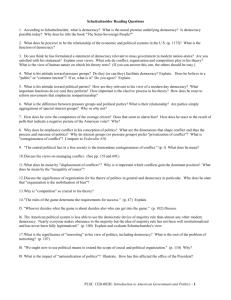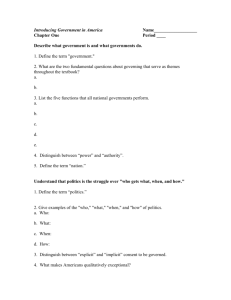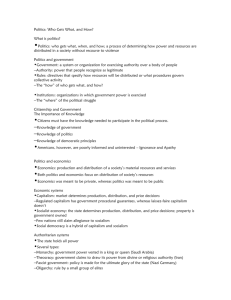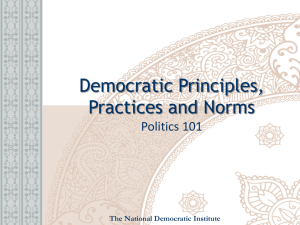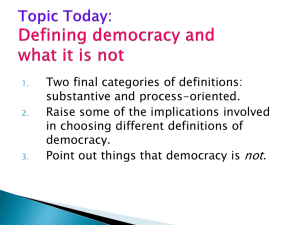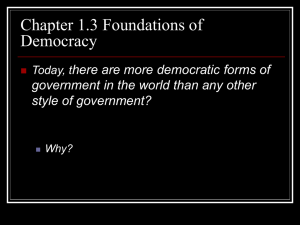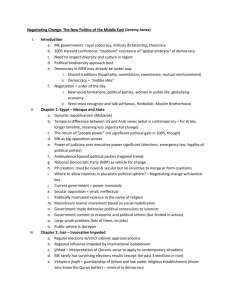Comparative Politics V. Changes and challenges to representative
advertisement
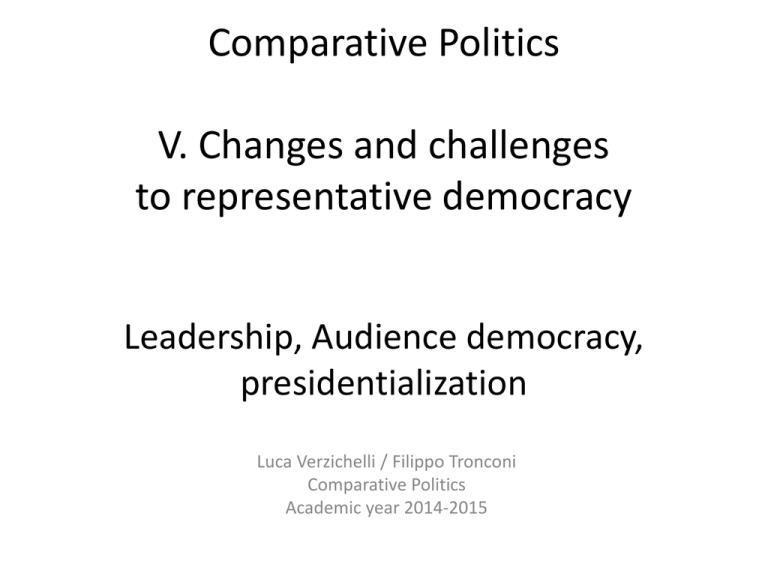
Comparative Politics V. Changes and challenges to representative democracy Leadership, Audience democracy, presidentialization Luca Verzichelli / Filippo Tronconi Comparative Politics Academic year 2014-2015 A Pyrros’ victory for the democratic model? Heritage of XX century and new challenges • After 1975: global challenges and increase of “ungovernable issues” for traditional democracies • Increase of the grey area of “quasi-democratic regimes”. Other democracies in permanent transitions without consolidation • Complexity of policy making • Crisis of mass party organizations • Exponential increase of political mistrust Approaches to the question of democratic transformation • New elitist approach (Sartori, the theory of democracy revisited, 1987) • Focus on different democratic dynamics (Huntington, the Third wave, 1991 vs. Przeworski and others) • Focus on policy outcomes and transformation of policy communities (different approaches) • Cultural and historical path dependencies (Putnam, making democracy works, 1993, Bowling alone, 2000) • Actor-centred institutionalism • Rational choice institutionalism Persistent emphasis on elites’ role … … but with some variations Elites should rule. But they are differently responsible and differently stratifies (“experts”, networks, interactions …). Citizens choose between elite proposals but by means of different democratic tools. Result should be an efficient government but with new system of control over elite’s action. Politics is still too (or even more) complex for average citizens. But we should avoid apathy Redefining all the representative institutions? • Reintroducing the argument of the decline of representative institutions (quest for participatoy democracy and deliberative democracy) • Decline of party-democracy and emphasis on public opinion (Manin) • Counter-democracy and new social pluralism (Rosanvallon) • Still a relevant role of representative institution but challenges from social complexity, immigration, etc. Presidentialization of parliamentary democracy An old story? • Prime ministers with stable majorities tent to act like presidents with reduced accountability to parliamentary members • They increasingly used media to keep the “campaign spirit” and prolong the honey moon with the public opinion • They always know that there won’t be a “no confidence” vote against them if they keep given conditions under control • Personality use to matter more than policy, party (or even ideology) since decades Leader democracy (Koroseny 2005) Audience democracy Manin, principles of representative government 1996 • Metamorphoses and not crisis of parliamentary democracy • Crucial aspect: “maturity” of public opinion • Modernization and its effect on the delegation chain • Divide between politics perceived as “leader issues” and politics to be shared with ordinary people Variations in representative government (Manin) parliamentarism Party democracy Audience democracy Election of rep. Personal trust Local links notable Party loyalty Personal mediated trust Class membership Electoral market activists Media expert Partial autonomy of rep. Free expression Party leaders guide Freedom of public Voice of the people at the gate of parliament Opposed views public opinion and within parliament electoral views do not coincide Opinion polls Trial by discussion parliament Party negotiation corporativism Images Negotiation between government and interest groups Debate in the media Causes of presidentialization (Poguntke and Webb 2005) • Internationalization of politics • Growth of the State (but not of State’s resources) • Changing structure of mass communication • Erosion of (some) traditional cleavage politics


